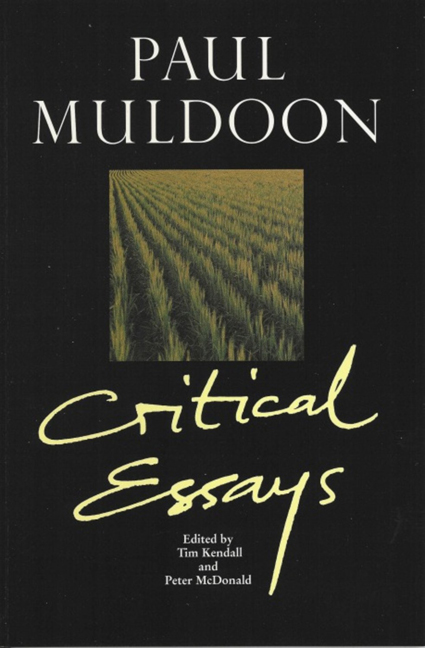Book contents
- Frontmatter
- Contents
- Acknowledgements
- Notes on Contributors
- Introduction
- ‘Thirteen or Fourteen’: Paul Muldoon's Poetics of Adolescence
- Never Quite Showing his Hand: Robert Frost and Paul Muldoon
- For Father Read Mother: Muldoon's Antecedents
- Pax Hibernica/Pax Americana: Rhyme and Reconciliation in Muldoon
- Muldoon and Pragmatism
- ‘All That’: Muldoon and the Vanity of Interpretation
- Paul Muldoon's Transits: Muddling Through after Madoc
- ‘All Art is a Collaboration’: Paul Muldoon as Librettist
- Muldoon's Remains
- Index
‘All That’: Muldoon and the Vanity of Interpretation
- Frontmatter
- Contents
- Acknowledgements
- Notes on Contributors
- Introduction
- ‘Thirteen or Fourteen’: Paul Muldoon's Poetics of Adolescence
- Never Quite Showing his Hand: Robert Frost and Paul Muldoon
- For Father Read Mother: Muldoon's Antecedents
- Pax Hibernica/Pax Americana: Rhyme and Reconciliation in Muldoon
- Muldoon and Pragmatism
- ‘All That’: Muldoon and the Vanity of Interpretation
- Paul Muldoon's Transits: Muddling Through after Madoc
- ‘All Art is a Collaboration’: Paul Muldoon as Librettist
- Muldoon's Remains
- Index
Summary
I could really make nothing of the business; it proved a dead loss. After all I had always […] liked him: and what now occurred was simply that my new intelligence and vain preoccupation damaged my liking. I not only failed to run a general intention to earth, I found myself missing the subordinate intentions I had formerly enjoyed. His books didn't even remain the charming things they had been for me; the exasperation of my search put me out of conceit of them. Instead of being a pleasure the more they became a resource the less […]. It was humiliating, but I could bear it – they only annoyed me now. At last they even bored me, and I accounted for my confusion – perversely, I allow – by the idea that Vereker had made a fool of me. The buried treasure was a bad joke, the general intention a monstrous pose.
Henry JamesWe're not beginning to… to… mean something?
Samuel BeckettIn but one of so many Muldoonian tricks and twists, ‘A Trifle’ from the collection Quoof puts the issue of significance, of meaning, overtly in question, from its title onwards:
A TRIFLE
I had been meaning to work through lunch
the day before yesterday.
Our office block is the tallest in Belfast;
when the Tannoy sounds
another bomb alert
we take four or five minutes to run down
the thirty-odd flights of steps
to street level.
I had been trying to get past
a woman who held, at arm's length, a tray,
and on the tray the remains of her dessert—
a plate of blue-pink trifle
or jelly sponge,
with a dollop of whipped cream on top.
All critics agree that this sonnet is about insignificance, but all critics are intent on revealing the significance of such insignificance. For one reader, the routine mundanity of Belfast bomb alerts is momentarily relieved by the small wonder of a trifle in a vicariously erotic moment, an encounter with a vaguely mammary dessert. But for the same reader, the poem attains altogether greater significance when seen in dialogue with Seamus Heaney who, in comparable though not identical circumstances as bombs exploded in Belfast, decided to abandon a poetry recording.
- Type
- Chapter
- Information
- Paul MuldoonCritical Essays, pp. 110 - 124Publisher: Liverpool University PressPrint publication year: 2004



